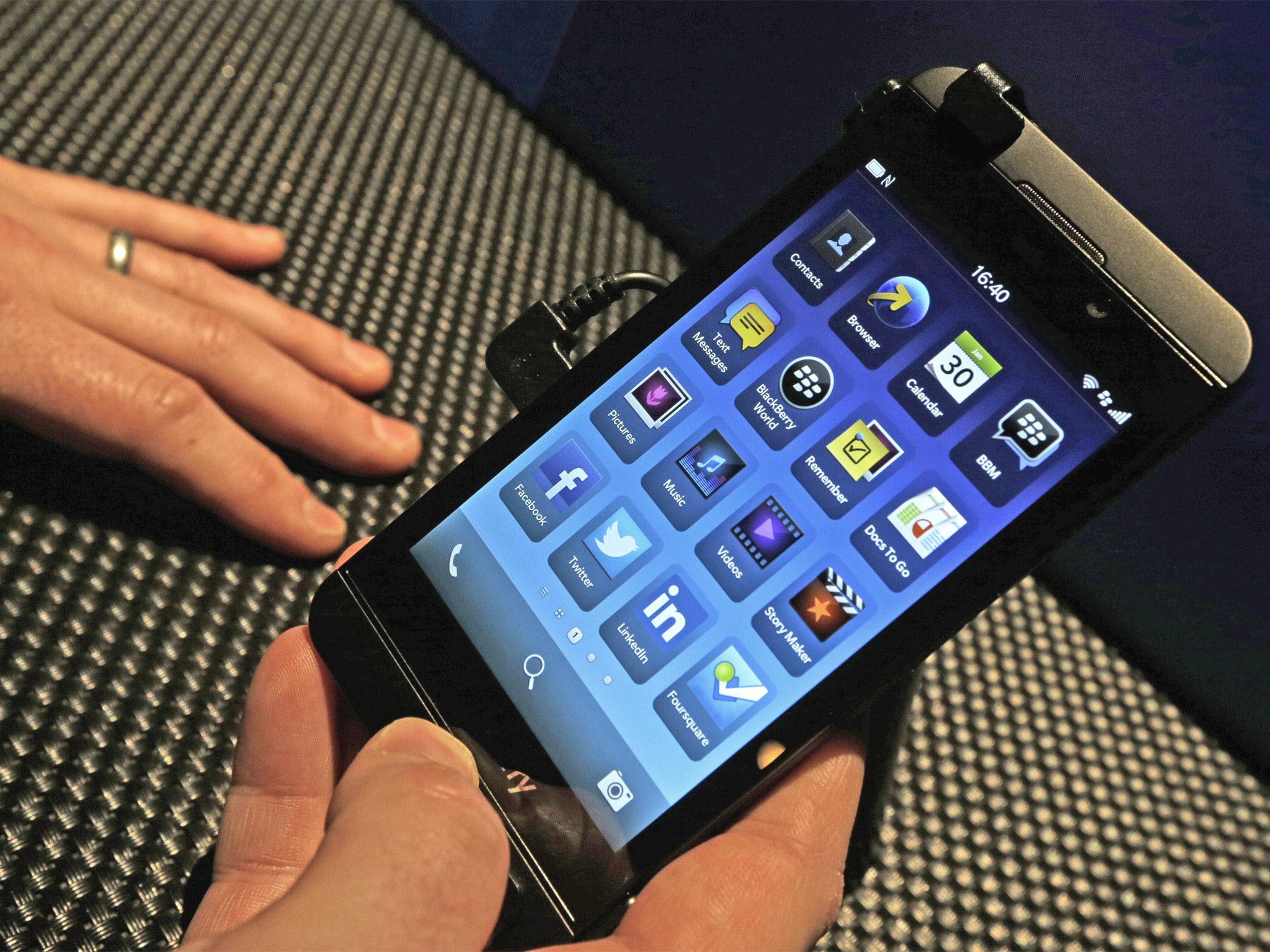Not according to type: it's out with the keyboard and in with a touchscreen as BlackBerry goes for an iPhone look with its Z10

Your support helps us to tell the story
From reproductive rights to climate change to Big Tech, The Independent is on the ground when the story is developing. Whether it's investigating the financials of Elon Musk's pro-Trump PAC or producing our latest documentary, 'The A Word', which shines a light on the American women fighting for reproductive rights, we know how important it is to parse out the facts from the messaging.
At such a critical moment in US history, we need reporters on the ground. Your donation allows us to keep sending journalists to speak to both sides of the story.
The Independent is trusted by Americans across the entire political spectrum. And unlike many other quality news outlets, we choose not to lock Americans out of our reporting and analysis with paywalls. We believe quality journalism should be available to everyone, paid for by those who can afford it.
Your support makes all the difference.There was a time when the world loved BlackBerry. Kids adored its messenger service, corporate titans favoured its Qwerty keypad (so much easier to tap out those mission-critical emails on the move), while everyone from Cristiano Ronaldo to P Diddy, Lady Gaga and even Barack Obama were rarely seen in public without one.
In 2009 Research in Motion, the company behind the brand, was the fastest growing corporation in the world. The global economy was shot to pieces, but profits were up 84 per cent in three years. But from there it was all downhill, slowly at first then a calamitous descent into oblivion that saw its share price fall from $140 (£90) to just $8 (£5) last October.
Yesterday, BlackBerry took the first step on what it hopes will be a journey back to the big time. In a simultaneous series of launches from New York’s Lower East Side to the Burj Khalifa in Dubai, it made a grab for some Apple-style cool via a series of new phones and a revamped operating system the does more than just deliver unwelcome messages from your boss. The latest products build in flashy graphics, better cameras, bigger screens and greater connectivity with social media, alongside new office-friendly features.
The struggling brand, which suffered tremendously when Apple’s iPhone and Samsung’s Galaxy range of smartphones hit the market, also attempted to reinvent itself by abandoning the Research in Motion name it has used since the 1980s but which is barely known beyond the business world. Instead, the company has been rechristened, simply, BlackBerry.
Taking a leaf out of Apple’s wildly successful playbook, the company has also rebuilt its app store, BlackBerry World. It is now an iTunes-style digital mall, hawking music, movies and TV episodes as the the company wagers its future on the re-launch. BlackBerry has spent months working with developers to ensure 70,000 apps will be available from its launch - including a new app from The Independent.
In fact, the new operating system looks more like Apple’s iOS than ever before, with touch gestures to navigate between screensand the kind of smooth transitions that the late Steve Jobs used to wow the world with.
Among the new features is a reworking of the BlackBerry Messenger, or BBM, service, which now accommodates video calls. The new screen-share feature allows users to share pictures – or PowerPoint presentations – with each other instantly.
Of the two handsets unveiled yesterday, the Z10 is a touchscreen device – again not unlike the iPhone – while the Q10 comes with a more traditional physical keyboard.
The stakes for Blackberry – and new boss Thorsten Heins, who was named chief executive after a shake-up of the top team last year – couldn’t be higher. As recently as three years ago it commanded a 20 per cent share of the global smartphone market, but in the three months to December last year that figure had plummeted to under 4 per cent, according to data from research firm Strategy Analytics. In the US, its share went from more than 40 per cent to a paltry 2 per cent.
“We have definitely been on a journey of transformation” said Heins, speaking in New York. Yesterday, the shares jumped as the line-up was unveiled but then began falling sharply as news filtered out that they won’t be available in the key US market until March, or thereabouts. In the UK, Phones4U will begin selling the Z10 from this morning.
But the more meaningful test will come in the long term, when market share figures emerge. Apple has been losing ground to Samsung, but BlackBerry will be hoping the future tastes a little sweeter today.
Join our commenting forum
Join thought-provoking conversations, follow other Independent readers and see their replies
Comments